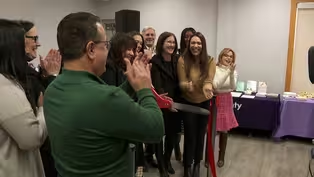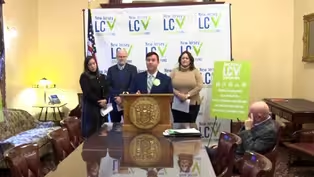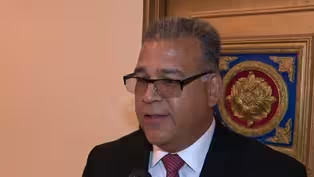NJ Spotlight News
What leaving World Health Organization would mean for US
Clip: 1/23/2025 | 6m 10sVideo has Closed Captions
Interview: Perry Halkitis, dean of School of Public Health, Rutgers University
President Donald Trump signed an executive order Monday withdrawing the U.S. from the World Health Organization, finishing what he started during his first term when his administration formally began exiting the WHO amid the COVID-19 pandemic. In his order, the president said the WHO “ripped off” the U.S., the largest funder of the organization and a major contributor to its work.
Problems playing video? | Closed Captioning Feedback
Problems playing video? | Closed Captioning Feedback
NJ Spotlight News is a local public television program presented by THIRTEEN PBS
NJ Spotlight News
What leaving World Health Organization would mean for US
Clip: 1/23/2025 | 6m 10sVideo has Closed Captions
President Donald Trump signed an executive order Monday withdrawing the U.S. from the World Health Organization, finishing what he started during his first term when his administration formally began exiting the WHO amid the COVID-19 pandemic. In his order, the president said the WHO “ripped off” the U.S., the largest funder of the organization and a major contributor to its work.
Problems playing video? | Closed Captioning Feedback
How to Watch NJ Spotlight News
NJ Spotlight News is available to stream on pbs.org and the free PBS App, available on iPhone, Apple TV, Android TV, Android smartphones, Amazon Fire TV, Amazon Fire Tablet, Roku, Samsung Smart TV, and Vizio.
Providing Support for PBS.org
Learn Moreabout PBS online sponsorshipIn another significant move this week, President Trump signed an executive order withdrawing the US from the World Health Organization.
Finishing what he started during his first term when his administration formally began exiting during the Covid 19 pandemic.
In his order, the president said the World Health Organization ripped off the U.S., the largest funder of the group and a major contributor to its work, accused the organization of mishandling the pandemic of being politically influenced by other members like China and of not adopting urgently needed reforms.
But many public health experts say the move makes the U.S. and other countries less safe from infectious disease and other threats.
For more on what the decision means for people here and around the world, I'm joined by Perry Halkitis, dean of the Rutgers School of Public Health.
Perry, good to talk to you.
Let me ask you first, what does leaving the World Health Organization mean specifically for the U.S. and for folks here in New Jersey?
Yeah.
Well, thank you for that question.
So leaving the World Health Organization has enormous implications for the United States.
If you think about the W.H.O.
as a collection of countries that information other and help each other during health crises, then we are choosing to not be part of that.
It is an effective network of sharing information, of letting each other know about infectious diseases that are emerging, letting each other know about humanitarian crises that are existing, and then collectively working as nations of the world to help solve those problems.
So what it does mean for us is that potentially we become disconnected from all of this helpful information.
Now, perhaps if it was 1000 or 1200, you know, the year we were in and we were this isolationist country that didn't cross borders and people didn't come in and supplies didn't come in, that might be fine.
But in fact, it's 2025 and we know that we're a global community.
And so what we're choosing to say is that we're not going to be part of the health global community, despite the fact that we continue to be part of the financial and economic global community, and so will the impacts be, I guess, obvious?
Will they be immediately felt or will these be things that are, you know, perhaps long term?
We're looking especially at infectious diseases when we think about preventing, say, another pandemic.
Right.
So we're not going to feel it tomorrow for sure.
It's going to take a year's process to be out of the organization completely.
I don't actually believe we're going to leave.
I think this is a tactic on the part of the administration to get the W.H.O.
to rethink some of its infrastructure issues and some of its financial issues.
But in the long term, what it means is that we become somewhat disconnected from relevant and timely and global world decision making around health issues.
And we empower, which is, you know, interesting to me.
The one country that remains in the W.H.O.
to have the most power at that point is China.
And we know perfectly well beyond not that we know that China did not exactly play openly and fairly during the Covid pandemic, and yet they're going to have the biggest stake in the W.H.O., potentially if the United States steps outside, it does this isn't that.
I mean, isn't that part of the Trump administration's criticism that, you know, the World Health Organization has been too lenient or has maybe taken China at its word when it's maybe, perhaps should have known better than to do that?
Yes, we are, and I think and look, I don't I'm not going to sit here and say that the Trump administration is completely wrong in being critical of, you know, the show the W.H.O.
has missteps like like all organizations misstep, like the Trump Organization, a misstep for 50 years in its dealings in financial matters.
But overall, the benefit has outweighed the negative.
Now, the question about China and the fact of the population is bigger also, and potentially they should pay more.
Yeah, maybe that should be revisited.
So I don't think everything is completely ludicrous.
That's being asked for.
Right.
The financial restructuring potentially, you know, the potentially looking at the systems, every organization should evolve.
But I think the way of dealing that doing that is working with the W.H.O.
directly, instead of using bullying tactics to try to get what we want.
So with withdrawing and essentially taking that money, with us, does that then disable the Joe from making any of those reforms?
Have they shown that they've already taken steps in that direction?
The W.H.O.
has taken major steps over the course of the last few years after Covid, recognizing the problems that we face, I think many people working in public health have realized that we made missteps in how we approached, you know, the disease, how we approach vaccination, how we approach prevention, how we approach treatment.
And the W.H.O.
has been part of it.
The United States withdrawing that money?
Yes, absolutely.
It what it does is it prevents the organization from being able to, continue to evolve, but it also creates somewhat of a global crisis in countries that are less affluent, countries where disease spreads but don't have the resources of the United States.
Right.
And then if you believe the United States, part of our responsibility is to make sure that we're a good global citizen and we make so much wealth and we should be helping others, but it is potentially has much worse ramifications ultimately for those countries, although we too will be accepted because it's a sorry Brown.
I mean, yeah.
And if we think that somehow smaller countries without wealth are going to survive on their own emerging diseases, and if we think that those diseases are not going to enter our country, either through trade or travel, we are being extremely foolish because we will ultimately be affected by this.
Doctor Perry Halkitis is the dean of the Rutgers School of Public Health.
Good to talk to you as always.
Thank you.
Brianna.
My pleasure.
Breastfeeding support at NJ’s first ‘baby café’
Video has Closed Captions
Clip: 1/23/2025 | 3m 37s | Camden moms can receive breastfeeding assistance and education weekly (3m 37s)
NJ environmental groups launch new agenda
Video has Closed Captions
Clip: 1/23/2025 | 4m 11s | Advocates hope ‘Enviro Fix in ‘26’ will focus candidates for governor (4m 11s)
NJ hits a solar energy milestone
Video has Closed Captions
Clip: 1/23/2025 | 57s | Solar now powering almost a fifth of NJ households (57s)
State Sen. Doug Steinhardt tapped for US Attorney for NJ
Video has Closed Captions
Clip: 1/23/2025 | 1m 6s | Steinhardt served as chairman of the state GOP during Trump’s 2020 reelection campaign (1m 6s)
Providing Support for PBS.org
Learn Moreabout PBS online sponsorship
- News and Public Affairs

Top journalists deliver compelling original analysis of the hour's headlines.

- News and Public Affairs

FRONTLINE is investigative journalism that questions, explains and changes our world.












Support for PBS provided by:
NJ Spotlight News is a local public television program presented by THIRTEEN PBS



